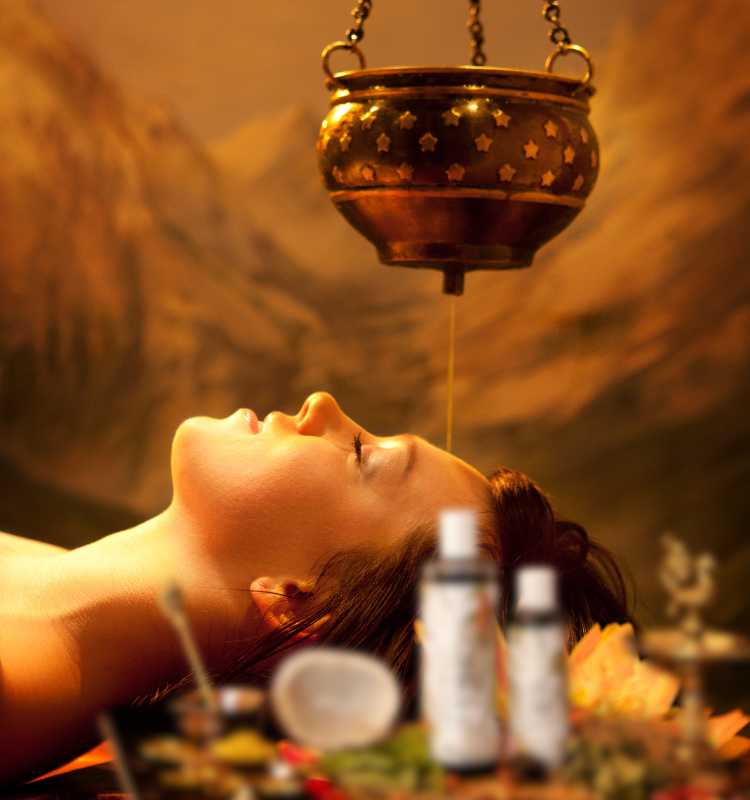Ayurvedic Treatment for Depression in Coimbatore
Best Ayurvedic Treatment for Depression in Coimbatore
Ayurvedic Treatment for depression at Avanika Ayurveda involves a holistic approach, integrating counseling (Sattvavajaya Chikitsa), herbal remedies, dietary adjustments, and lifestyle modifications to restore mental and emotional balance

Pure Herbal

Evidence Based

Guranteed Results
Book An Ayurvedic Treatment for Depression in Coimbatore.
If you are looking for an Ayurvedic Treatment for Osteoarthritis in Coimbatre Book an appointment and get free consultation.
Aim of Our Ayurvedic Treatment for Depression?
The primary aims of Ayurvedic treatment for Depression are to:
- Alleviate Psychic Symptoms: Reduce feelings of distress, hopelessness, dejection, sorrow, mental fatigue, anxiety related to failure, misery, agitation, inadequacy, and suicidal thoughts.
- Pacify Somatic Symptoms: Address physical manifestations like fatigue, dryness of mouth, excessive sweating, wandering mind, burning sensation of skin, tremors, horripilation, and inability to hold oneself.
- Balance the Doshas: Primarily focus on pacifying aggravated Vata, which is considered the main culprit in Vishaada, while also addressing any imbalances in Pitta and Kapha.
- Strengthen Mental Resilience: Enhance mental strength, courage (Dhairya), self-awareness (Jnana), understanding of proven sciences (Vijnana), recollection of positive experiences (Smriti), and self-control (Samadhi) to navigate life’s challenges.
- Promote Overall Well-being: Restore harmony between the mind, body, and spirit to foster a sense of peace and contentment.
Aim of Avanika's Ayurvedic Treatment Package for Depression
- Reduction in Depressive Symptoms: Alleviation of sadness, hopelessness, and lack of motivation.
- Decreased Anxiety and Worry: Calming of the mind and reduction in feelings of apprehension.
- Improved Energy Levels: Overcoming fatigue and restoring vitality.
- Enhanced Mood and Emotional Stability: Promoting a more positive and balanced emotional state.
- Better Sleep Quality: Addressing sleep disturbances often associated with depression.
- Improved Concentration and Focus: Reducing mental peacelessness and enhancing clarity.
- Increased Resilience to Stress: Strengthening the mind’s ability to cope with challenges.
- Holistic Healing: Addressing the root causes of imbalance rather than just suppressing symptoms.
- Natural and Gentle Approach: Uses herbal remedies and therapies with minimal side effects when consumed as per the physician’s advice
- Personalized Treatment: Complete treatment plan based on individual constitution and specific symptoms.

What is Depression?
Depression is described by a state of mental distress and a lack of initiative stemming from the fear of failure. Depression is a mood disorder that drains you of hope, motivation and energy and keeps you in a consistent feeling of sadness. It starts with subtle signs like difficulty in focusing, poor recalling abilities, feeling low quite often, and changes in appetite. Most of the people tend to ignore these signs, till it manifests as a clinical illness and can have serious health implications. It is a complex disorder most likely triggered by overlapping biological, psychological, and environmental factors. It is much more common than we think and anyone can suffer from depression, even a person who appears to live in relatively ideal circumstances.

What are the symptoms of Depression?
Depression, being a psychosomatic disorder, the symptoms can be classified similarly as follows:
Psychic Symptoms:
- Distressed, unhappy, grieved in mind.
- Hopelessness, lassitude.
- Dejection, sorrow
- Fatigue of mind
- Fear and anxiety or apprehension of failure
- Miserable state / depression
- Anxiety
- Feeling of inadequacy.
- Thoughts of death/suicide
- Crying spells
Somatic Symptoms:
- Dryness of mouth.
- Excessive sweating.
- Wandering mind.
- Burning sensation of skin.
- Inability to hold oneself steady)
- Anorexia
- Sleep disturbances
- Body pain
What are the causes of Depression?
The exact cause of depression is not yet known. Depression can occur spontaneously, without any obvious reason. Some experts think it could be due to imbalance in the brain chemicals, while some believe it could be due to a genetic defect. Some believe that a person’s environment and emotions play a crucial role in developing depression.
Hence, depression can be defined in ‘bio-psycho-social’ terms, meaning that it is a complex disorder most likely triggered by overlapping biological, psychological, and environmental factors.
Risk factors
- Family history and genetics
- History of physical, emotional or sexual abuse
- Social isolation or loneliness
- Low socioeconomic status
- Stressful life events like loss of a loved one, divorce, job loss & financial issues
- Medical conditions like ongoing or chronic physical pain or disease
- Inflammation
- Traumatic brain injury (TBI)
- Certain medications that treat hypertension, cancer, and seizures
- People who are easily overwhelmed
- History of other mental health conditions
- Lifestyle factors like use of recreational drugs and alcohol
- A poor or imbalanced diet with deficiency of vital vitamins and minerals like omega, vitamin D
Ayurvedic Perspective
Ayurveda views Vishaada as primarily a disorder of the mind (Manasika Roga) arising from an imbalance in the body’s fundamental energies (Doshas), particularly Vata, and influenced by the three mental qualities (Gunas): Sattva, Rajas, and Tamas. The apprehension of failure and the resulting lack of motivation are seen as key features. The involvement of somatic symptoms highlights the mind-body connection in this condition. The differential diagnoses of Kaphaja Unmada (a type of psychosis with Kapha dominance) and Anidra (insomnia) suggest that Vishaada can overlap with or be related to other mental and sleep disorders.
The primary line of management, Sattvavajaya Chikitsa, emphasizes psychological support and counseling. This involves:
- Ashwashana (Reassurance): Providing comfort and hope to the patient.
- Harshana (Encouragement): Motivating the patient to engage in positive activities.
- Jnana (Personal Awareness): Helping the patient understand their condition and its causes.
- Vijnana (Proved Sciences): Imparting knowledge and understanding of therapeutic approaches.
- Dhairya (Assurance): Instilling courage and confidence in the patient’s ability to recover.
- Smriti (Experience Sharing): Sharing stories of others who have overcome similar challenges.
Samadhi (Establishing Self Control): Guiding the patient to divert their mind from negative thoughts and develop self-regulation
Ayurvedic treatment for Depression in Coimbatore
Ayurvedic treatment for Vishaada is multi-faceted and tailored to the individual’s specific presentation and constitution. It typically includes:
- Sattvavajaya Chikitsa (Counseling): As described above, this forms the foundation of psychological support.
- Herbal Remedies (Aushadhis): Various herbs known for their neuroprotective, mood-enhancing, and stress-reducing properties are used. Examples include:
- Vacha (Acorus calamus): Improves mental clarity and reduces dullness.
- Brahmi (Bacopa monnieri): Enhances cognitive function, reduces anxiety, and promotes relaxation.
- Ashwagandha (Withania somnifera): An adaptogen that helps the body cope with stress and improves energy levels.
- Shankhapushpi (Convolvulus pluricaulis): Calms the mind, improves memory, and reduces anxiety.
- Kushmanda (Benincasa hispida): A cooling and nourishing tonic for the mind.
- Jyothishmati Taila (Celastrus paniculatus oil): Enhances intellect and mental clarity (used internally).
- Mansyadi Kwatha: A herbal decoction for mental well-being.
- Saraswatarishta: An Ayurvedic tonic for the brain and nervous system.
- Kalyana Ghrita, Panchagavya Ghrita, Brahmi Ghrita: Medicated ghee preparations that nourish the brain and balance the mind.
- Unmadagaja Keshari Rasa: A herbo-mineral formulation used in certain cases (under expert supervision).
- Panchakarma (Detoxification and Rejuvenation): In more severe or chronic cases, specific Panchakarma therapies may be recommended to eliminate toxins and restore balance:
- Nasya (Nasal Administration): Using specific medicated oils or ghee to pacify Vata and improve mental clarity.
- Vamana (Therapeutic Emesis): To eliminate excess Kapha, which can contribute to lethargy and emotional stagnation (used cautiously after proper preparation).
- Virechana (Therapeutic Purgation): To eliminate Pitta and cleanse the digestive system, indirectly benefiting mental well-being.
- Yapana Basti: A specific type of medicated enema to nourish and strengthen the body and mind.
- Rasayana Therapy (Rejuvenation): Certain Rasayana herbs and formulations like Shilajatu Rasayana Kalpa and Amalaki Rasayana Kalpa may be used to promote longevity, vitality, and mental resilience.
- Mridu Virechana (Mild Purgation): Gentle cleansing of the bowels with herbs like Avipattikar Churna may be recommended before treatment.
- Fasting (Langhana): Short-term fasting may be advised in some cases to improve digestion and mental clarity.
Lifestyle Recommendations for Depression Patients
Adopting a healthy and balanced lifestyle is crucial for managing and preventing Vishaada:
- Proper Sleep (Nidra): Maintaining a regular sleep schedule and ensuring adequate rest is essential for mental and emotional well-being. Avoid night awakening.
- Meditation and Mindfulness: Regular practice of meditation and mindfulness techniques helps to calm the mind, reduce stress, and improve self-awareness.
- Self-Control Techniques: Developing strategies for managing negative thoughts and emotions is an integral part of Sattvavajaya.
- Personal Hygiene: Maintaining cleanliness and a sense of well-being contributes to a positive mental state.
- Regular Exercise: Physical activity has been shown to have mood-boosting effects. Gentle to moderate exercise is recommended.
- Spending Time in Nature: Connecting with nature can have a calming and uplifting effect on the mind.
- Maintaining Social Connections: Engaging in meaningful relationships and avoiding isolation is important for emotional support.
Diet During Ayurvedic Treatment for Depression
A Sattvic (pure, wholesome) diet is recommended to support mental clarity and emotional balance:
- Favor Fresh and Natural Foods: Emphasize whole grains (Godhuma – wheat, Raktashali – red rice), legumes (Mudga – green gram), fresh fruits (Draksha – grapes, Kapittha – wood apple, Kushmanda – ash gourd), and vegetables (Parval – pointed gourd, Vastuka – goosefoot).
- Include Healthy Fats: Ghee (clarified butter) and coconut are considered beneficial.
- Consume Cow’s Milk (Godugdha): If digestible, consume milk as it is nourishing and calming, but in moderation.
- Avoid:
- Liquor: Can disrupt mental balance and worsen depression.
- Viruddhashan (Incompatible Food Combinations): Can interfere with digestion and create toxins.
- Spicy Foods: Can aggravate Pitta and Rajas, leading to agitation.
- Stale Foods: Lack vital energy and can be detrimental to health.
- Night Awakening: Disrupts the body’s natural rhythms.
- Ensure Proper Digestion: Eat at regular times and avoid overeating.
How to Prevent Depression ?
- Manage Stress Effectively: Practice stress-reducing techniques like yoga, meditation, and deep breathing.
- Maintain a Balanced Diet: Follow a Sattvic diet that nourishes both the body and mind.
- Ensure Adequate Sleep: Aim for regular and restful sleep.
- Engage in Regular Physical Activity: Make exercise a part of your daily routine.
- Cultivate Positive Social Relationships: Ensure nurturing supportive social connections.
- Practice Mindfulness and Self-Awareness: Pay attention to your thoughts and emotions.
- Avoid Suppression of Natural Urges: Address bodily needs in a timely manner.
- Seek Support When Needed: Don’t hesitate to reach out to friends, family, or professionals if you are struggling with mental health issues.
What are you waiting for...
Book an Appointment
Hours & Contact
28A Bharathi Park 7th Cross, Saibaba Colony, Coimbatore
641043
+9142229 69555
+9189039 69555
info@avanikaayurvedic.com
Open All Days 7:00 AM -7:00 PM
